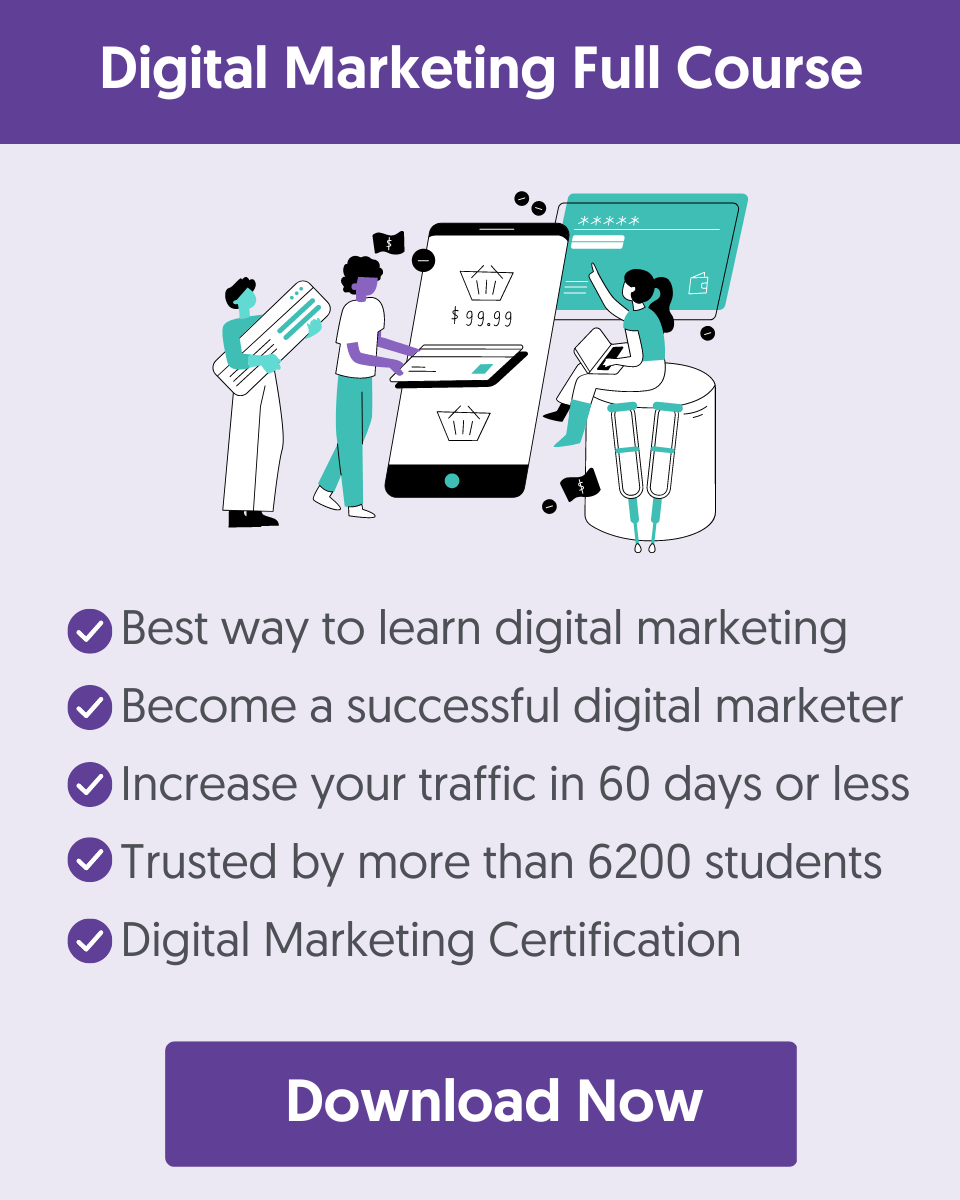What is Google EEAT & How To Improve It
E-E-A-T (Experience, Expertise, Authoritativeness, and Trustworthiness) is a set of guidelines used by Google Quality Raters when evaluating the quality of the results after an algorithmic change.
The main purpose is to ensure Google delivers search results that are trustworthy and high quality. EEAT is not a direct Google ranking factor, but it’s an important concept for modern SEO.
In this post, you’ll learn how Google E-E-A-T guidelines influence SEO strategies and how you can optimize your content to improve your credibility in the eyes of Google.

What Does E-E-A-T Mean?
E-E-A-T stands for Experience, Expertise, Authoritativeness, and Trustworthiness. These four pillars make up a core component of Google’s Rater Guidelines for search quality.
Those are the rules “Quality Raters” use to evaluate the quality of the search results, especially for YMYL (Your Money or Your Life) topics.
Quality raters work in third-party companies outsourced by Google to help them evaluate the search results after making changes to the search algorithm.
Although E-E-A-T isn’t a direct ranking factor for Google, it does determine how content is distributed on the SERPS to a certain level.
Google wants to ensure results are served to users with strong E-E-A-T. Investing in these principles can help you rank higher and improve user trust, leading to more conversions for your website and a stronger online reputation.
Let’s look at each of the pillars in closer detail.
Experience
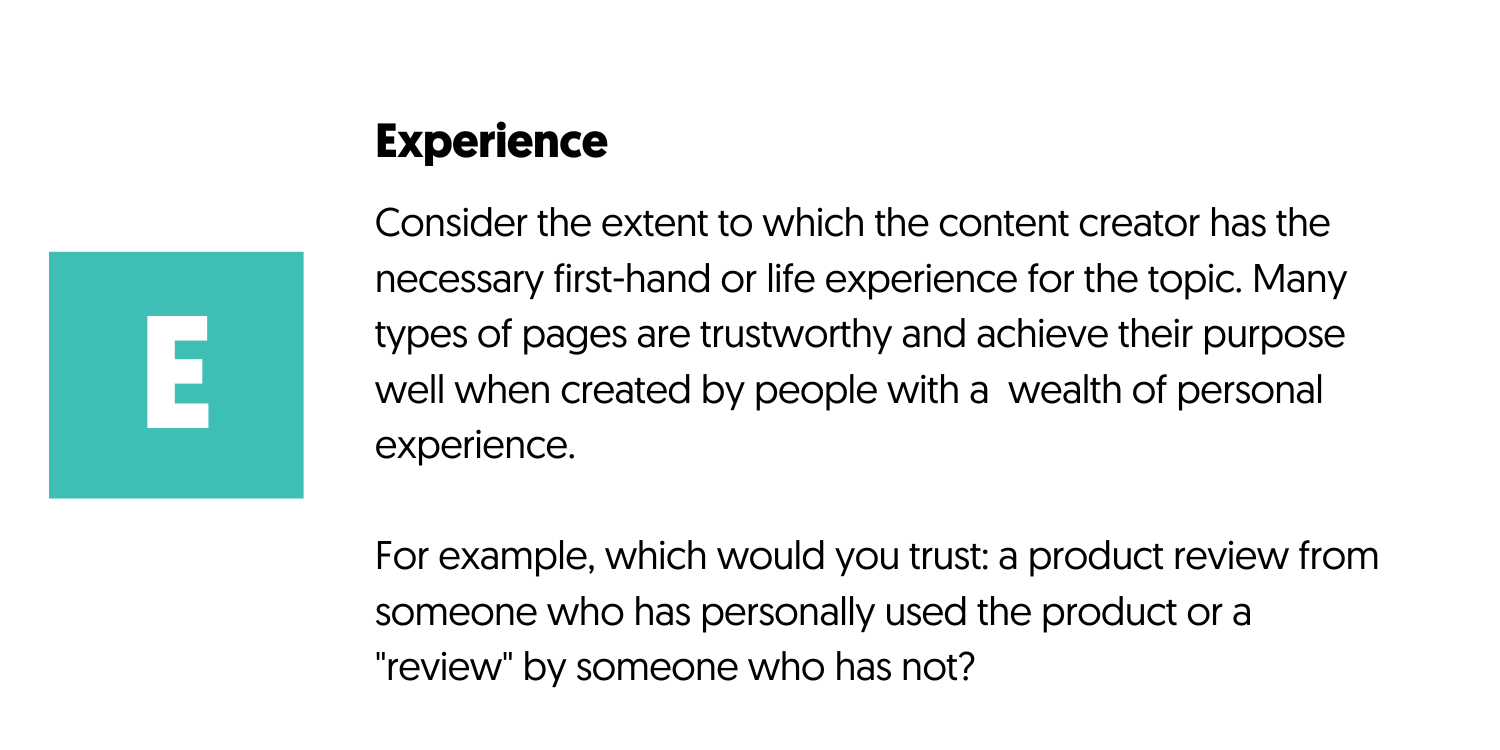
Experience allows Google to evaluate whether the content produced was created with a degree of actual experience. This is particularly important in today’s world of AI-generated content.
While AI can create good content, it can’t provide any true insights into genuine human experiences. Instead, it can only make assumptions about what people may experience.
It’s unlikely to be a coincidence that Google added the new E (Experience) to the previous E-A-T guidelines shortly after ChatGPT was officially launched.
Experience, particularly authentic human experience, is a core differentiator between human and AI-written content.
Companies and content creators can demonstrate experience in various ways, from showing the real people behind their content to sharing a human being’s real thoughts and experiences related to a topic.
Expertise
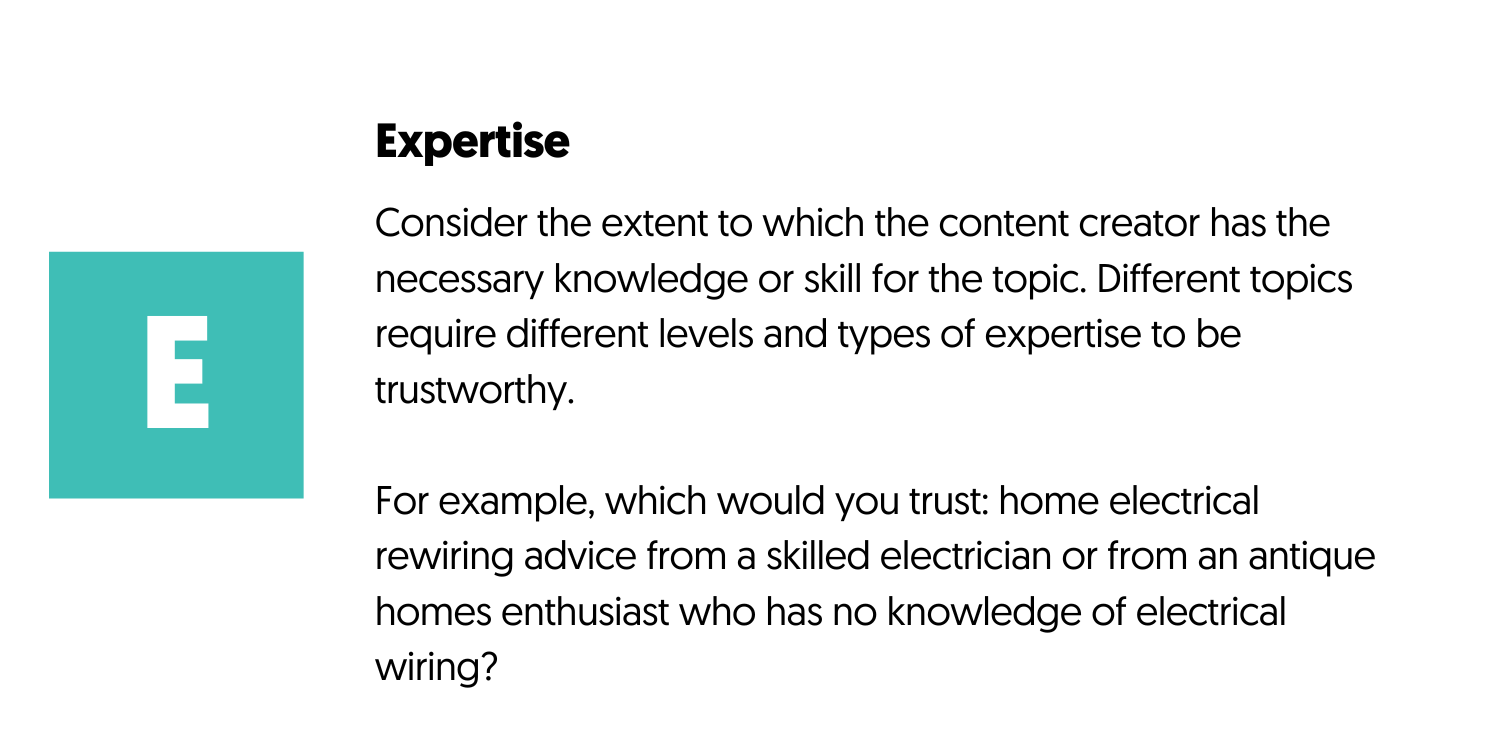
Expertise is the second “E” in the E-E-A-T framework. It encourages quality raters to determine whether authors of a topic have specific expertise in that area. This naturally overlaps with the other pillars of E-E-A-T.
If a customer is searching for information about the best software to address a specific problem, they’re more likely to trust an author with clear experience and expertise in that area.
Demonstrating the authority and expertise of a writer also improves the experience.
Readers are more likely to get valid, actionable, and genuine insights from people with experience, helping them to rapidly resolve problems.
Authoritativeness
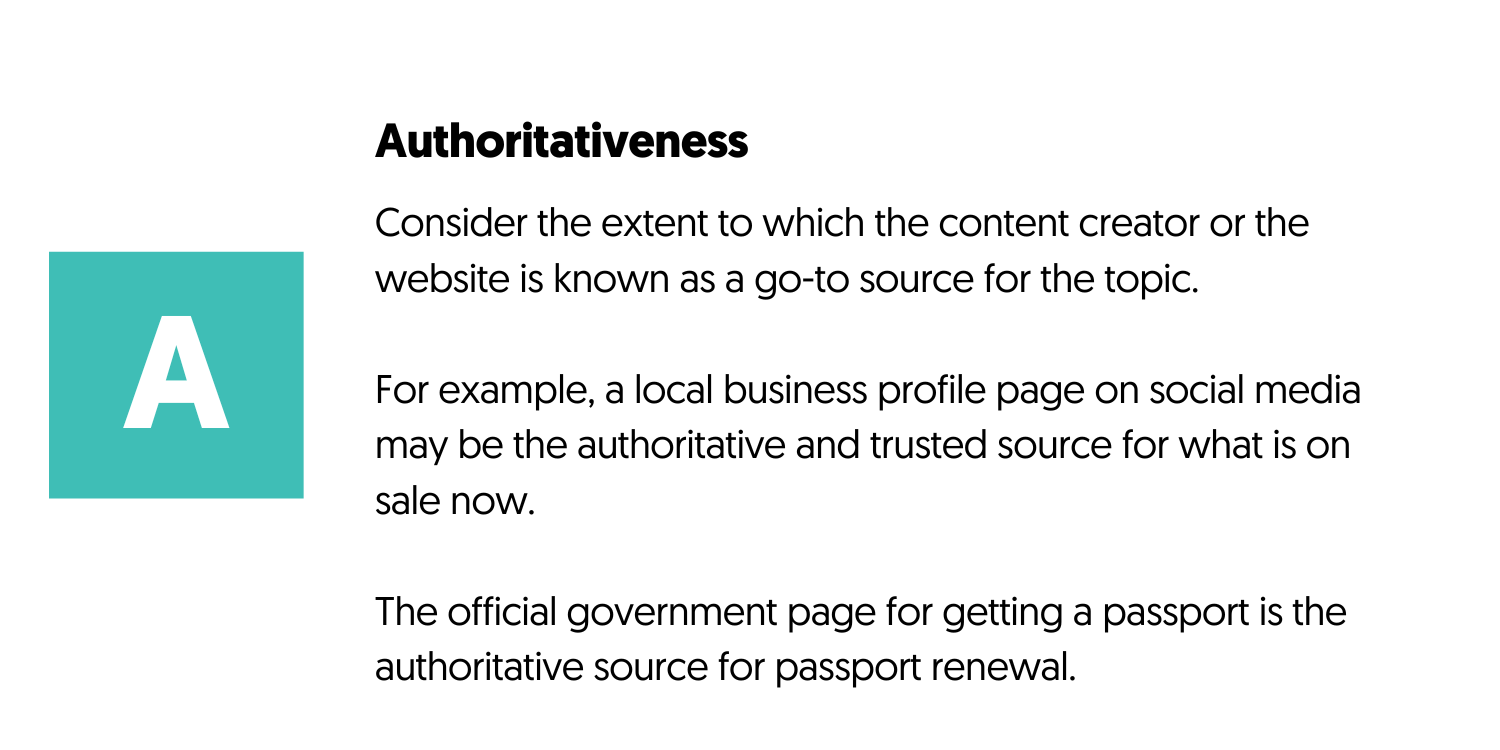
Authoritativeness, the “A” in the E-E-A-T guidelines, also overlaps with the other pillars.
Authoritativeness refers to a company or individual’s overall reputation in an industry or niche.
Google quality raters are asked to review the authority of the content, the content creator, and the website overall.
For instance, according to Google’s Search Quality Guidelines, an article on neck pain on the WebMD website would likely be seen as authoritative because:
- It comes from a publication associated with medical advice
- The contributors on the website are all qualified professionals
- Experts (such as doctors) evaluate the content for accuracy
The authority of a website or article can be further enhanced by other authorities in the same industry linking to the same content.
Backlinks from authoritative sites, strong content architecture, and clear profiles for authors can all support authority levels.
Trustworthiness

Trustworthiness can be a little more complex to understand in the context of the Google E-E-A-T guidelines.
It’s often considered the most important part of E-E-A-T SEO. However, it’s actually composed of a combination of all the other pillars.
For content to be “trustworthy”, it needs to demonstrate authority, experience, and expertise at significant levels.
At the same time, Google also considers the user experience on a website to determine its trustworthiness.
A website that takes a long time to load lacks security settings, or has problematic architecture is more likely to be deemed untrustworthy.
Similarly, issues like citing untrustworthy content, hiding content behind ads, and others can harm trust ratings.
Google’s Search Quality Rater guidelines refer to things like a checkout page with an insecure connection as being indicators of an “untrustworthy” site.
How Does Google use E-E-A-T to help determine quality content?
Google is constantly exploring new ways to improve the online experience for its users. In its early years, the company only made a handful of changes to its algorithms for ranking and distributing content.
Now, Google makes thousands of changes on a constant basis.
While some updates are slight, others are far more significant. For instance, in 2023, Google announced a core algorithm update connected to the helpful content system strategy.
These major changes may influence different parts of your SEO strategy, but they’re all intended to serve the same purpose: improving content quality and user experience.
E-E-A-T is one of the most important frameworks Google Quality raters use to determine whether the content is valuable enough to appear at the top of the search engines or not.
Although the search giant may not classify E-E-A-T as a direct ranking signal, it is a core component in ensuring you can improve your organic presence online.
Google’s quality raters classify content into different levels of E-E-A-T, defined by the Google search quality rater guidelines. These include:
Lowest E-E-A-T
Pages ranked at the lowest level of E-E-A-T are considered untrustworthy, spammy, and potentially “harmful” in some cases.
Most pages that earn this rating are considered deceptive (impersonating other sites or using spammy tactics).
They may disguise ads as “MC” or Main Content, expose users to malicious downloads, harmful content, or scams, or aim to manipulate users.
Lacking E-E-A-T
Google’s guidelines indicate a website can “lack E-E-A-T” on topics even if it has a positive reputation elsewhere.
This indicates topical and page relevance is crucial. For instance, it doesn’t make sense for a cooking website to share a form for tax information.
Low-quality pages lack appropriate E-E-A-T for a number of reasons. They may not show adequate experience or expertise.
The website content creator, or the website itself, may be deemed an untrustworthy source for a specific type of content.
High Levels of E-E-A-T
Sites and pages with high E-E-A-T levels show experience, authority, and expertise, leading to higher levels of trust.
Google offers numerous examples of high E-E-A-T websites, including government and news websites and highly relevant business websites.
Although it can be challenging to demonstrate high levels of E-E-A-T, a persistent strategy for content creation and management can increase your chances of success.
Very High Levels of E-E-A-T
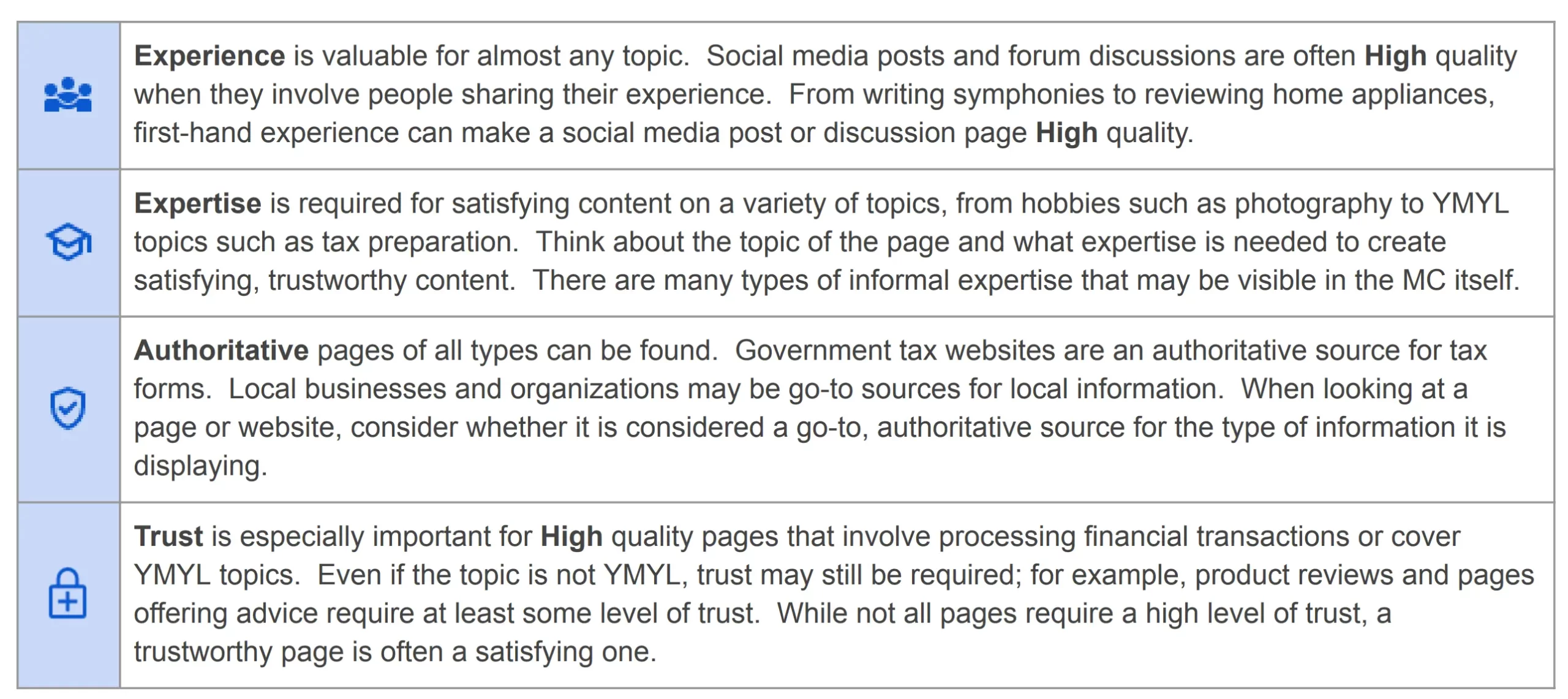
Websites showing the highest levels of E-E-A-T look authoritative to a user and demonstrate strong levels of experience and expertise.
They satisfy search intent perfectly. However, according to Google, the standards for highest-quality content can vary.
For instance, in the news landscape, the sites with the highest levels of E-E-A-T will generally include accurate, investigative insights alongside in-depth content.
In the informational landscape, content must be original, accurate, clearly communicated, and reflect expert insights.
Practical Tips for Improving E-E-A-T
Excelling the development of E-E-A-T content takes significant focus and effort. Even with a comprehensive strategy, it can take time to convince Google that a website or page demonstrates all the right qualities.
Here are some actionable tips to guide you through your strategy:
How to Improve Experience (E)
Improving experience generally involves drawing attention to the real human beings behind your content and processes.
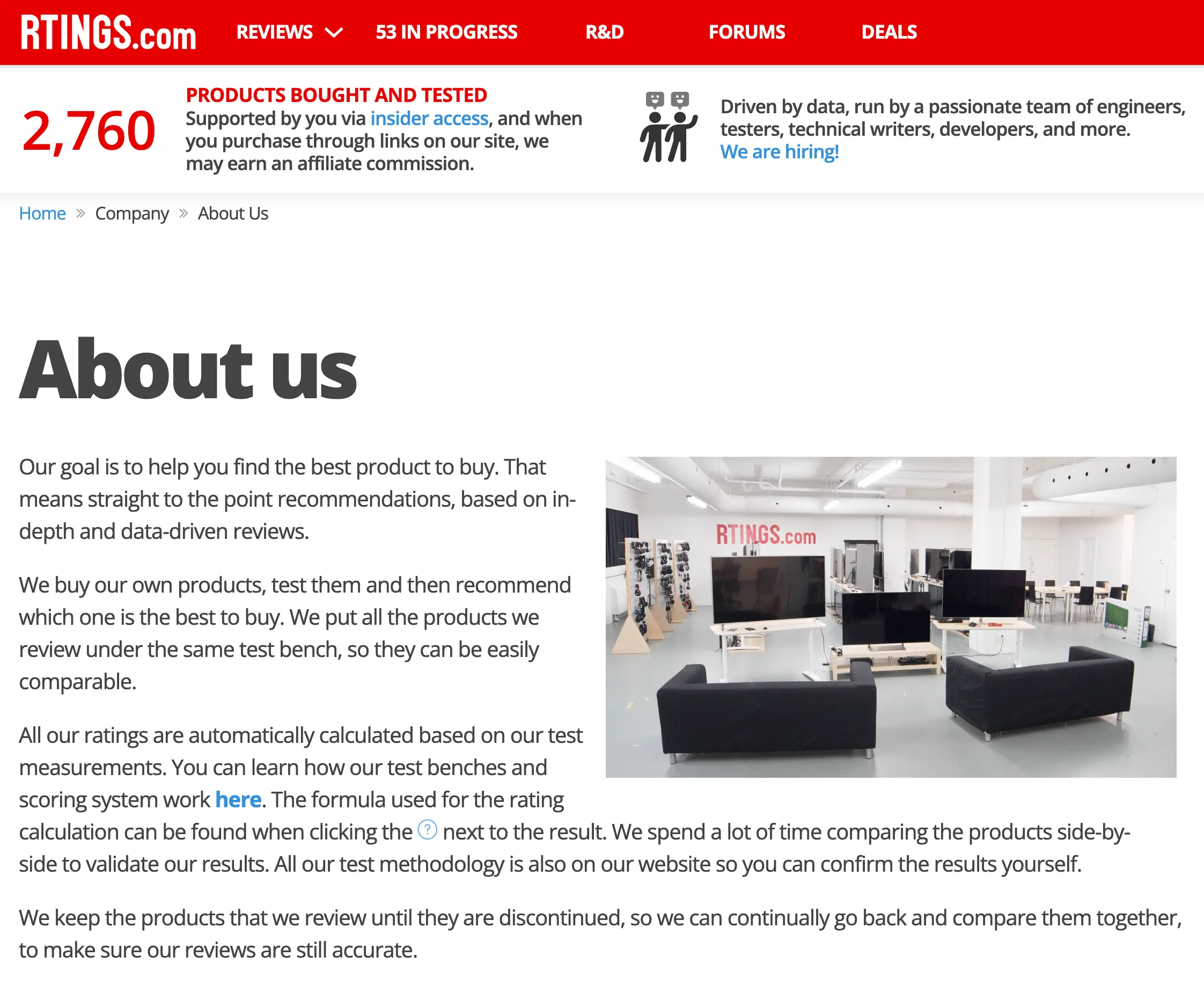
Google wants to see evidence that the person behind a page is a legitimate source of information. There are a few ways to accomplish this:
- Share insights into your company: Creating a well-structured “About Us” page to demonstrate your team’s credentials and qualifications can give your entire website more authority. Each individual should be able to demonstrate authority.
- Use author bios: Author bios bring expertise and experience from an author into the page or post itself. They can demonstrate a writer’s past experience and credentials and highlight why users should trust their input.
- Demonstrate experience: Writers of any topic should demonstrate their experience of the topic in question. For instance, if you’re writing a review for a new smartphone, showcase how you interacted with each feature on the device.
Genuine opinions and human insight go a long way toward demonstrating experience.
When creating content, think about how you can highlight the human being behind your piece. What kind of insights can you offer that an AI bot couldn’t provide?
How to Improve Expertise (E)
Demonstrating expertise means showing both Google and your readers that the authors of your content are trustworthy sources of information.
In other words, do they have the knowledge, credentials, and qualifications necessary to give reliable information?
Expertise generally refers to the extent of knowledge demonstrated within an article or by a writer.
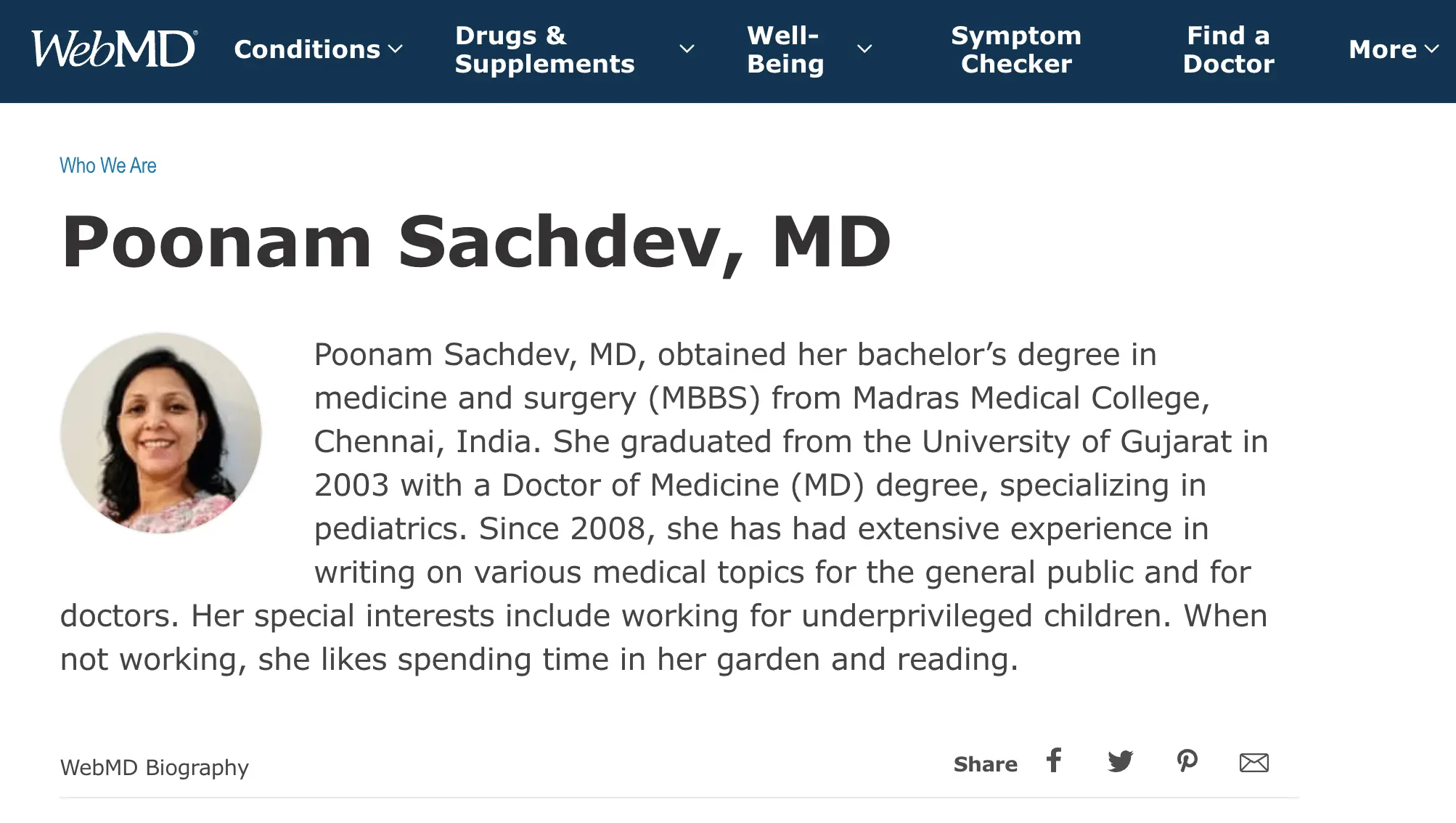
Content creators should always produce in-depth, actionable content demonstrating a deeper knowledge of a topic than a generalist could provide.
Other ways to demonstrate expertise include:
- Extensive research: Ensure all content is well-researched to minimize the risk of inaccuracies. Make sure you’re providing valuable insights to your audience, answering questions they might have, and addressing pain points. For instance, if you’re writing an article on a new form of accounting software, explain how it works, what its pros and cons are, and how people might use it.
- Highlight credentials: Highlighting a writer’s credentials is a good way to demonstrate both experience and expertise. Showcase your qualifications on your website, as well as relevant certifications, either on your “About Us” page, your “Bio” section, or both.
- Use authoritative citations: When referencing a statement or fact revealed by another company or individual, use relevant citations. Link to official sources, such as studies and research papers, rather than other articles, where possible. Linking to credible sources shows you’ve done the necessary research for an article.
How to Improve Authoritativeness (A)
Demonstrating authority in your content doesn’t just improve your E-E-A-T ranking, it can also improve your reputation with customers.
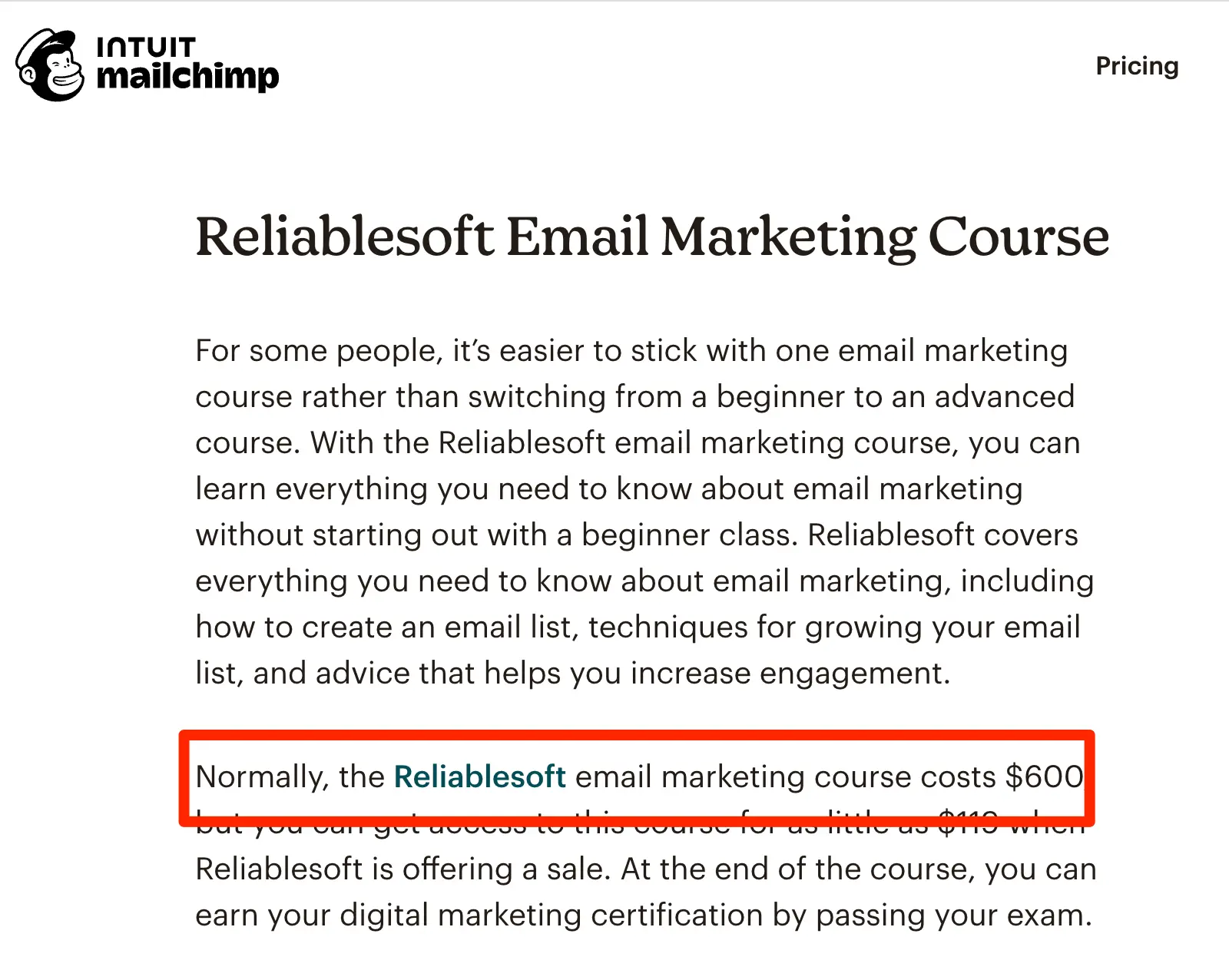
A good way to demonstrate authority is to create a solid content strategy invested in answering all of the questions your potential site visitor might have about your niche. Other strategies include:
- Backlinks: Earning mentions from authoritative publications, websites, or figures in your field is the most important factor for establishing Authority in your niche. Though earning links can be complex and difficult, you can start by contributing to sites with guest posts to high authority websites, participating in podcasts or interviews, or investing in collaborations with other sites.
- Internal linking: Just as external links can support your SEO strategy, internal linking can help you to rank too. Internal linking helps to guide users and crawl bots through relevant, connected content on your site.
- Community interactions: Engaging in online communities can help the name of your company or writers to be associated more frequently with a specific topic. Participate in forums, social media platforms and groups, and Q&A sites.
Make sure you commit to protecting your brand reputation and authority, too, by monitoring online mentions, claiming your social profiles, and watching for negative reviews or spammy backlinks.
Remember, you can earn more authoritative backlinks by creating original content assets, sharing visuals on social media, and publishing original research.
How to Improve Trustworthiness (T)
Creating a more “trustworthy” website in the eyes of Google requires an investment in all of the strategies above. However, you’ll need to commit to more than just preserving your reputation, strengthening your brand presence, and providing accurate content.
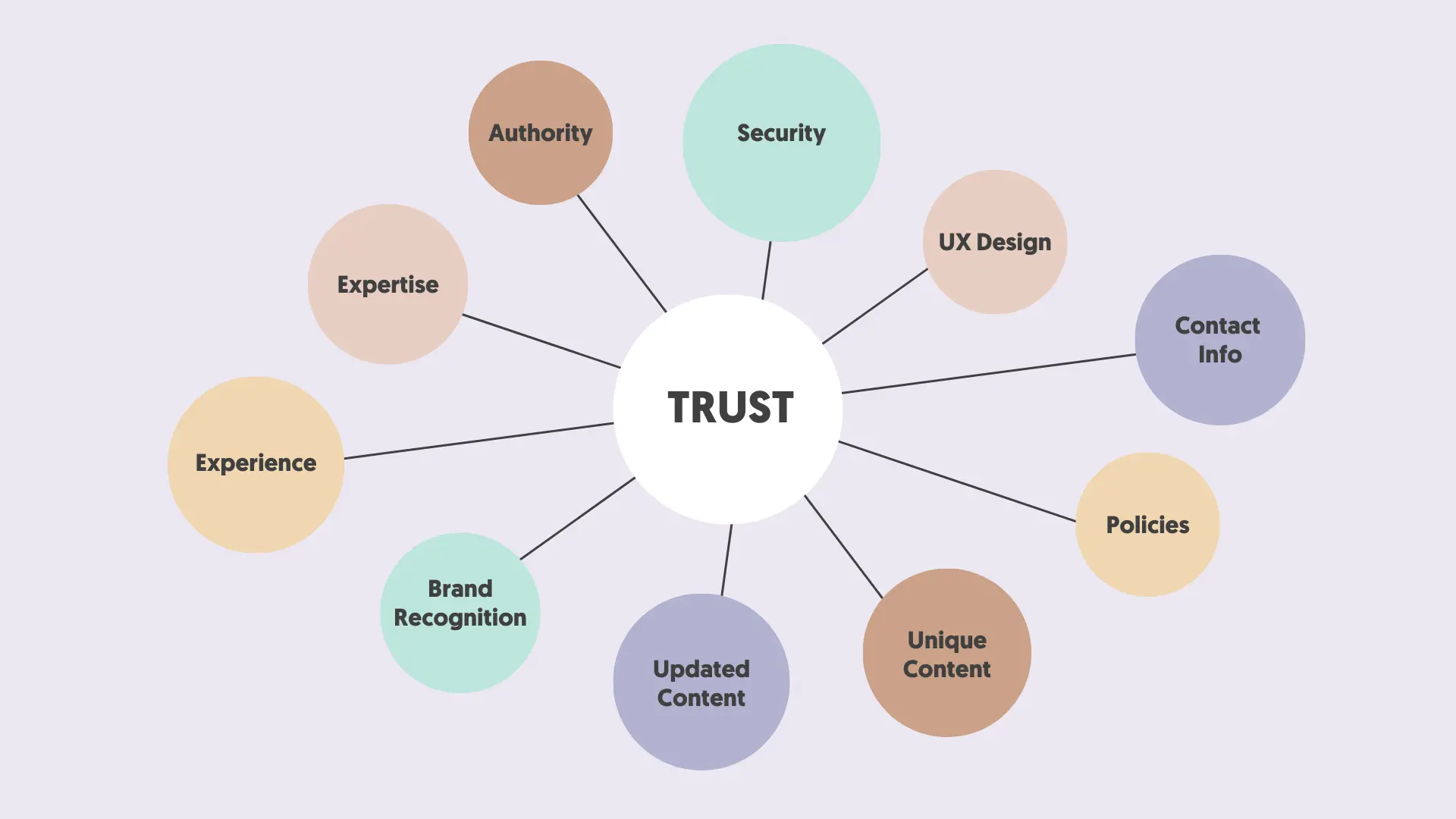
Trustworthiness also connects with the experience and security of your website. Websites without an SSL certificate may be seen as less trustworthy. Verifiability is also considered carefully by Google.
For instance, non-verifiable trust badges or the use of logos not connected to your company could harm your level of trust. To improve trustworthiness on your site:
- Use SSL certificates: Always ensure your website uses “HTTPS”, to encrypt the data of your users and protect their privacy. Remember, Google now defines websites without an SSL certificate as “not secure”.
- Share clear contact information: Make sure your customers can connect with you. Display clear, valid contact details, including a phone number, business address, and email. This demonstrates there’s a real entity behind the site.
- Provide policies: Share your privacy policy and terms of service on your website. This enhances your authority and boosts the level of trust a customer might feel toward your website.
- Use trust badges: Ensure you’re using trust badges correctly. Secure checkout badges, memberships to recognized industry organizations, and similar resources can help to increase trust and credibility.
- Prioritize user experience: Ensure your website is easy to use and navigate. Every site should be mobile-friendly, free from spammy content, and without misleading advertisements or claims.
- Update your content: Stale or out-of-date content can often be seen as less authoritative. Updating your pages regularly, particularly as information evolves over time, is a good idea to preserve trust levels.
- Create accurate, valuable content: Make sure you always double-check the facts in your content and deliver genuine value. Always provide references and citations for any statistics or information you use from other sites.
It’s also a good idea to have a strategy in place for managing your online reputation. Monitor and respond to reviews and insights left by your customers. Listen to comments, and monitor your online presence with social listening tools to keep up with negative press.
If you do receive feedback on any channel, make sure you respond promptly and professionally.
Acknowledge any issues customers might have with your site or content, correct inaccuracies, and demonstrate appreciation for the input you receive.
Conclusion
Ensuring your website or pages have a high level of E-E-A-T can be complicated. Google looks at a number of factors to determine how much experience, expertise, authority, and trust every piece of content might have.
However, by investing in the strategies above, you can improve your chances of creating higher-quality content. Not only will this improve your ranking with the search engines and your reputation with Google, but it could also enhance your relationship with your audience.

